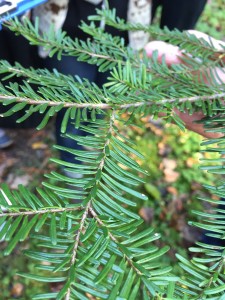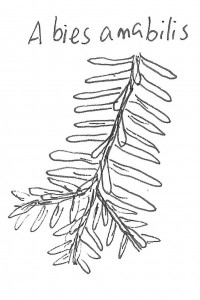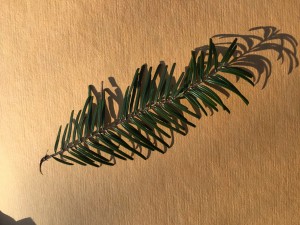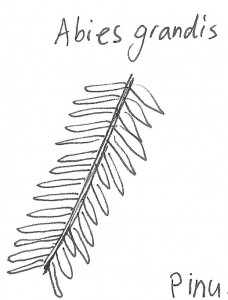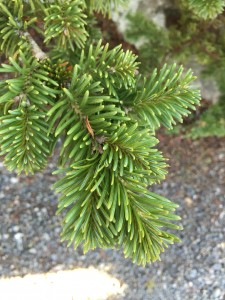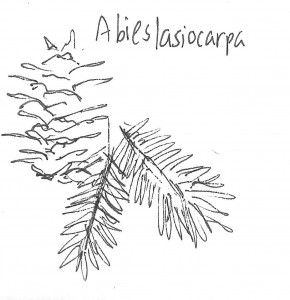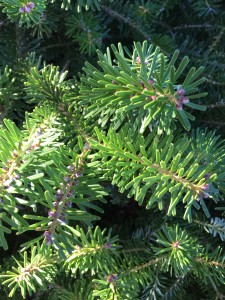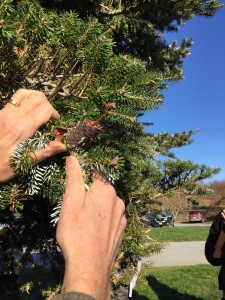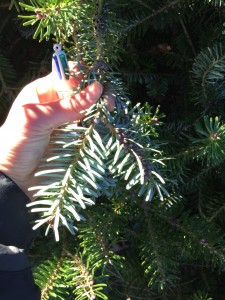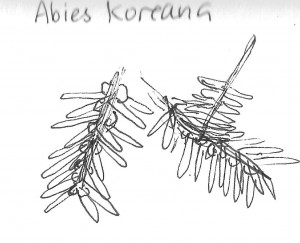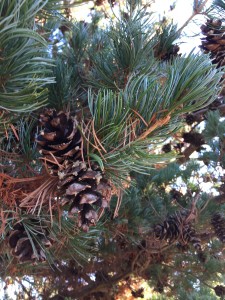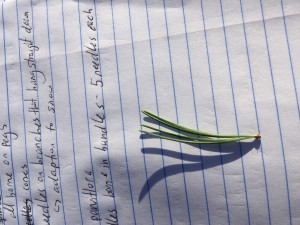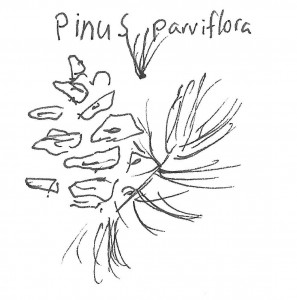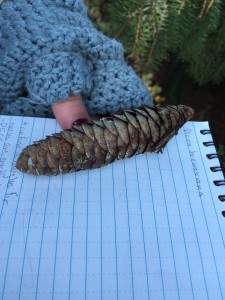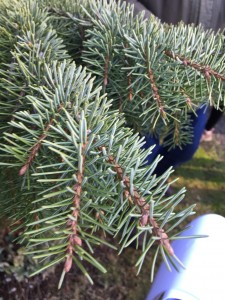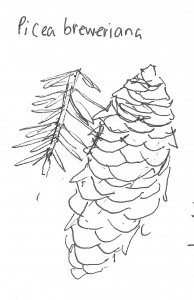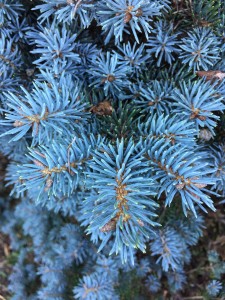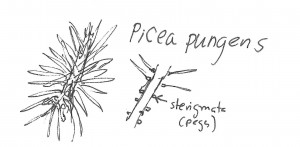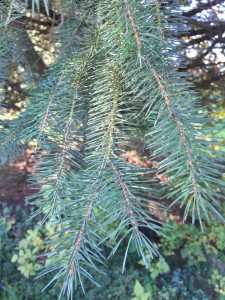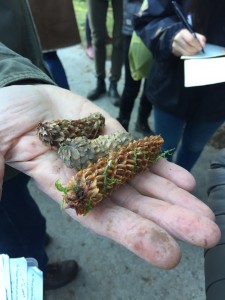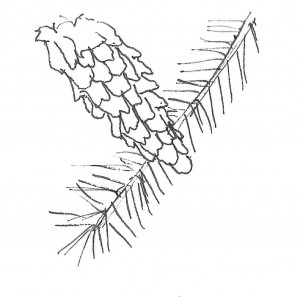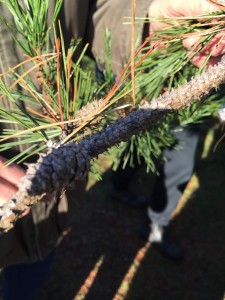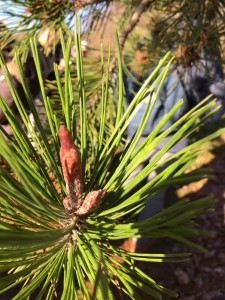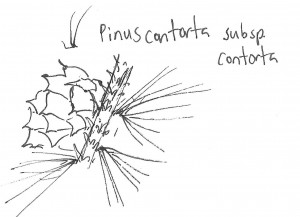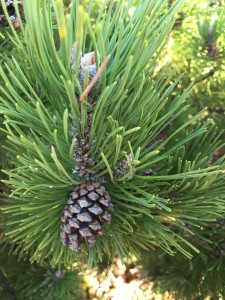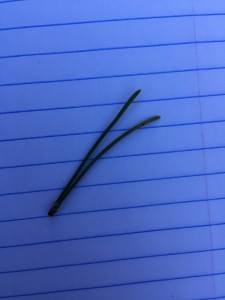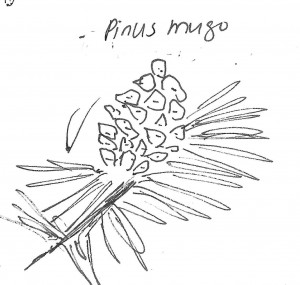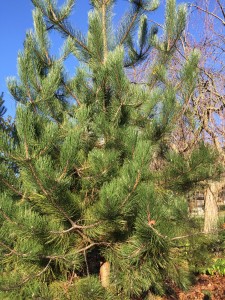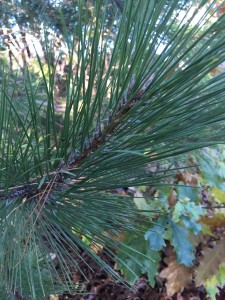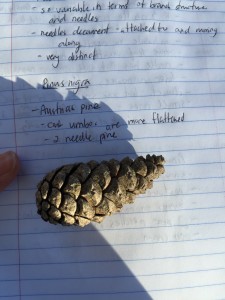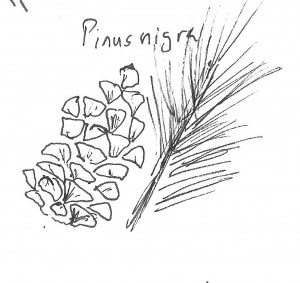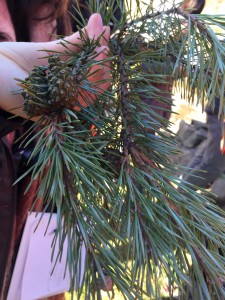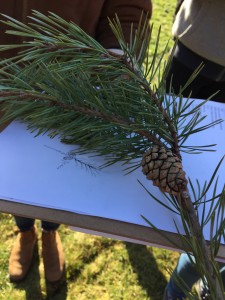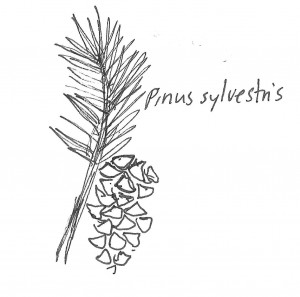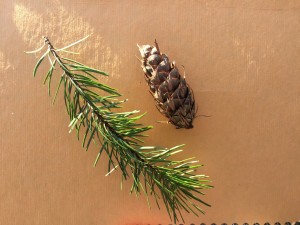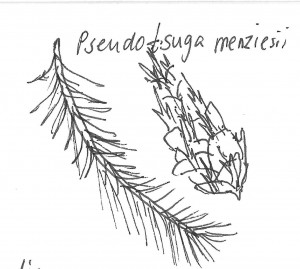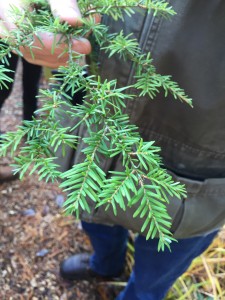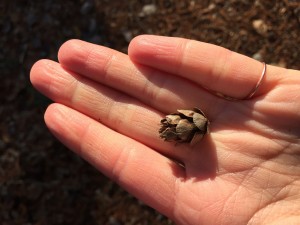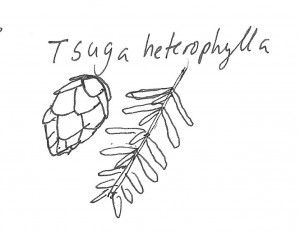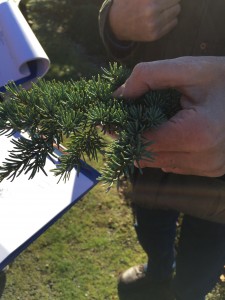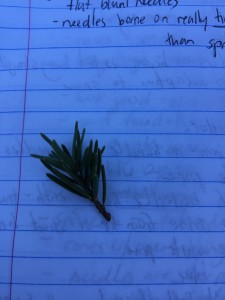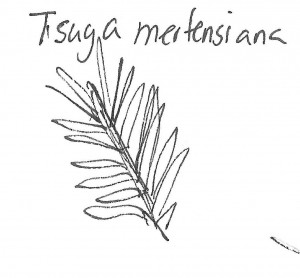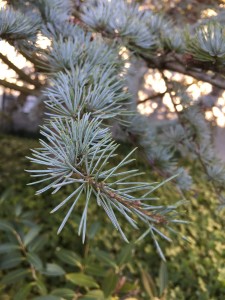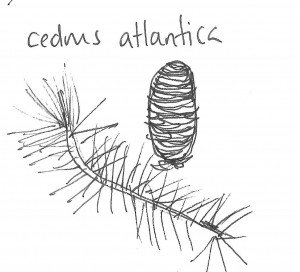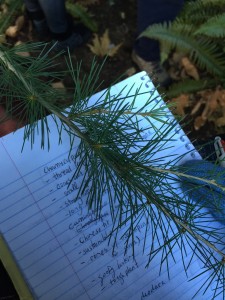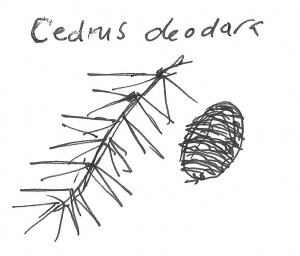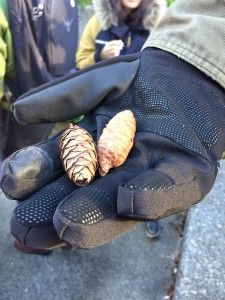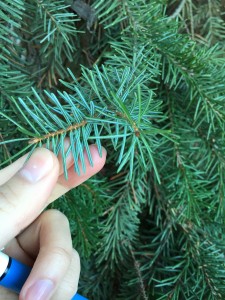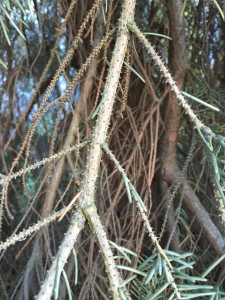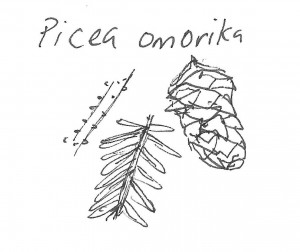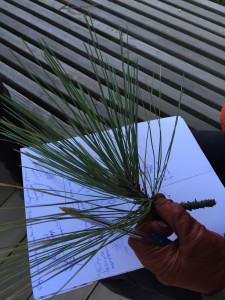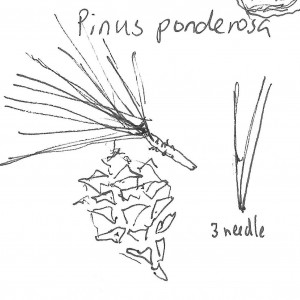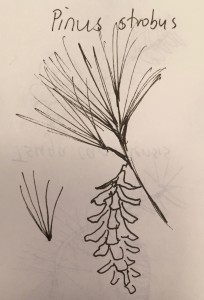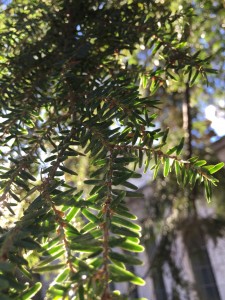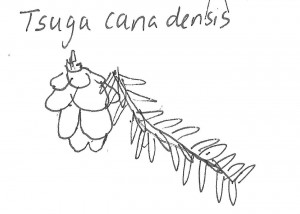Abies amabilis
Common name: amabilis fir
Useful cultivars and selections: –
USDA hardiness zone: 6
Mature height and spread: 10-40 m high and 4-8 m wide
Form: dense, conical, slender trunk
Water use:
Soil requirements: moist soil
Leaf arrangement: needles spirally arranged
Fall colour: evergreen
Flower/cone/fruit descriptions: oval to cone shaped, brown cones
Limitations: cannot tolerate urban conditions
Suitable uses: specimen or planted among other conifers
ID description: row of needles on top of branch that point forward, smells like tangerine
Abies grandis
Common name: grand fir
Useful cultivars and selections: –
USDA hardiness zone: 5
Mature height and spread: 10-25 m tall by 6-10 m wide
Form: dense, conical to pyramidal
Water use: high
Soil requirements: deep, well drained soils
Leaf arrangement: needles spirally arranged
Fall colour: evergreen
Flower/cone/fruit descriptions: narrow cones, blunt tip, greenish to purple, fall apart while still on the tree
Limitations: not suitable for urban conditions
Suitable uses: specimen or in a group
ID description: long, flatt needles, 2 rows, smell is like grapefruit peel mixed with cleaning fluid
Abies lasiocarpa
Common name: subalpine fir
Useful cultivars and selections: –
USDA hardiness zone: 3
Mature height and spread: 4-12 m tall by 3-6 m wide
Form: dense, whorled branches, columnar to conical, narrow
Water use:
Soil requirements: well drained
Leaf arrangement: spirally arranged needles
Fall colour: evergreen
Flower/cone/fruit descriptions: erect, barrel shaped cones, resinous, grey-brown
Limitations: balsam woolly adelgid, not tolerant of urban conditions
Suitable uses: specimen or in groups of other conifers
ID description: Needles borne all the way around the shot- can’t see twig between needles, smells like paint
Abies koreana
Common name: Korean fir
Useful cultivars and selections: –
USDA hardiness zone: 4
Mature height and spread: 4-8 m wide by 3-6 m wide
Form: conical, dense
Water use:
Soil requirements: deep, well-drained
Leaf arrangement: spirally arranged needles
Fall colour: evergreen
Flower/cone/fruit descriptions: cones showy, violet blue, fall off apart while still on the tree, upright
Limitations: cannot tolerate urban conditions
Suitable uses: good size for residential areas
ID description: Needles are short, blunt, well spaced out- you can see the twig between the needle, underside of needles is bright, silver-white, pleasant smell but not overwhelming
Pinus parviflora
Common name: Japanese white pine
Useful cultivars and selections: –
USDA hardiness zone: 5
Mature height and spread: 5-12 m tall and 6-8 m wide
Form: horizontal branches, flat top, irregular when young
Water use:
Soil requirements: well-drained, acidic soil
Leaf arrangement:
Fall colour: evergreen
Flower/cone/fruit descriptions: oval to elliptic cones, clusters of 6 or more
Limitations: cannot handle summer drought, sensitive to wind, white pine blister rust
Suitable uses: accent, specimen, in group
ID description: 5 needle bundles, twisted, blue-green colour
Picea breweriana
Common name: Brewer’s spruce
Useful cultivars and selections: –
USDA hardiness zone: 6
Mature height and spread: 8-15 m high by 6-8 m wide
Form: narrow form with ascending branches
Water use:
Soil requirements: acidic, moist, well drained
Leaf arrangement: spirally arranged
Fall colour: evergreen
Flower/cone/fruit descriptions: scales on cones are smooth and look like fish scales
Limitations: cannot tolerate shade, very hot conditions
Suitable uses: specimen or with other conifers on slope
ID description: needles are flat, blunt, and radiate all around the shoot (flat needles are not actually common is spruces, each needle is borne on little pegs
Picea pungens
Common name: Colorado spruce
Useful cultivars and selections: –
USDA hardiness zone: 2
Mature height and spread: 8-15 m tall by 6-8 m wide
Form: conical and broad with horizontal branching
Water use: high
Soil requirements: acidic, moist, well-drained
Leaf arrangement:
Fall colour: evergreen
Flower/cone/fruit descriptions: cones look like sitka spruce cones, have overlapping scales
Limitations: needs full sun, cannot tolerate very hot conditions
Suitable uses: accent tree or specimen
ID description: very sharp needles- 4 sided, needles borne on little peg, single needles, blueish colour
Picea sitchensis
Common name: Sitka spruce
Useful cultivars and selections: –
USDA hardiness zone: 6
Mature height and spread: 10-20 m tall by 8-12 m wide
Form: conical, branchlets horizontal, sweeping up at the ends
Water use: high
Soil requirements: acidic, moist, well-drained
Leaf arrangement:
Fall colour: evergreen
Flower/cone/fruit descriptions: long cones, purple pink, turning light brown
Limitations: needs full sun, cannot tolerate very hot conditions
Suitable uses: by itself or in group
ID description: needles are very sharp and flat
Pinus contorta subsp. contorta
Common name: shore pine
Useful cultivars and selections: –
USDA hardiness zone: 2
Mature height and spread: 5-12 m tall by 4-6 m wide
Form: rounded form, low branching
Water use:
Soil requirements: acidic soil
Leaf arrangement:
Fall colour: evergreen
Flower/cone/fruit descriptions: cones have prickles on apophysis, egg shaped, asymmetrical
Limitations: cannot tolerate shade
Suitable uses: can be grown in slab or container
ID description: Plain, grey bark, 2 needle pine (dark emerald green colour) (5 needle pine always have bluish cast to needles) (3 needle pines are grey-blue-green), reddish- brown bud
Pinus mugo
Common name: mugo pine
Useful cultivars and selections: –
USDA hardiness zone: 3
Mature height and spread: 5-12 m tall by 4-6 m wide
Form: branches ascend, form is irregular
Water use:
Soil requirements: acidic soil
Leaf arrangement:
Fall colour: evergreen
Flower/cone/fruit descriptions: brown cones, oval shaped, small, don’t fall for 3 years, radiate at right angles
Limitations: cannot tolerate shade
Suitable uses: can be grown in slab or container
ID description: whitish bud, shorter needles than Austrain pine (about half as long), 2 needle, yellow green needles, needle has flat side and round side, finer narrower stiff needles,
Pinus nigra
Common name: Austrian pine
Useful cultivars and selections: –
USDA hardiness zone: 4
Mature height and spread: 10 m tall after 50 years
Form: branches are horizontal, form is uniform, rounded to pyramidal
Water use: doesn’t need to be watered here
Soil requirements: acidic soil
Leaf arrangement:
Fall colour: evergreen
Flower/cone/fruit descriptions: brown cones, narrow to oval shaped, cone, point on umbo but not sharp
Limitations: cannot tolerate shade
Suitable uses: can be grown in slab or container, good for institutional landscapes
ID description: 2 needle, dark green, boring, attractive trunk, long needles that are slender
Pinus sylvestris
Common name: Scots pine
Useful cultivars and selections: –
USDA hardiness zone: 2
Mature height and spread: 7-12 m tall by 7-10 m wide
Form: round, branches irregular
Water use: low
Soil requirements: acidic soil
Leaf arrangement:
Fall colour: evergreen
Flower/cone/fruit descriptions: Cone looks like Austrain pine- just slightly smaller, posture of cones hang down
Limitations: cannot tolerate shade
Suitable uses: can be grown in slab or container, good for institutional landscapes
ID description: 2 needle, stout broad needles, orange bark
Psuedotsuga menziesii
Common name: Douglas fir
Useful cultivars and selections: –
USDA hardiness zone: 4
Mature height and spread: 10 -20 m tall by 6-10 m wide
Form: conical, becomes asymmetrical, horizontal branching
Water use: low
Soil requirements: well drained
Leaf arrangement:
Fall colour: evergreen
Flower/cone/fruit descriptions: Cones are brown, conical to elliptic, have conspicuous 3 point bracts (mice tails)
Limitations: cannot tolerate poor drainage
Suitable uses: out in the open, away from buildings
ID description: Flat needles, pointed but not sharp, leaf scar is elliptical (oval), distinctive smell- like forest here
Tsuga heterophylla
Common name: western hemlock
Useful cultivars and selections: –
USDA hardiness zone: 6
Mature height and spread: 10 -20 m tall by 6-15 m wide
Form: conical to column shaped, branches sweep out, branches droopy, top of tree has a crook
Water use: low
Soil requirements: well drained
Leaf arrangement:
Fall colour: evergreen
Flower/cone/fruit descriptions: Cones small and about 1 cm long
Limitations: cannot tolerate drying winds, urban conditions (salt, pollution), low humidity
Suitable uses: specimen or with other like trees in group
ID description: does not smell strongly, every needle is different length, shoots are hairy
Tsuga mertensiana
Common name: mountain hemlock
Useful cultivars and selections: –
USDA hardiness zone: 4
Mature height and spread: 10 -20 m tall by 6-15 m wide
Form: conical to column shaped, branches sweep out, branches droopy, top of tree has a crook
Water use: low
Soil requirements: well drained, OM rich
Leaf arrangement:
Fall colour: evergreen
Flower/cone/fruit descriptions: Cones about 6-8 cm long
Limitations: needs a cool place,cannot tolerate drying winds, urban conditions (salt, pollution), low humidity
Suitable uses: specimen or with other like trees in group
ID description: Protective wax coating on needles, needles borne all the way around the shoot- grows in the open
Cedrus atlantica
Common name: atlas cedar
Useful cultivars and selections: –
USDA hardiness zone: 6
Mature height and spread: 10-20 m tall by 7-15 m wide (15 m wide at base)
Form: pyramidal form
Water use: medium
Soil requirements: well-drained, summer moist
Leaf arrangement: spirally arranged
Fall colour: evergreen
Flower/cone/fruit descriptions: cones upright, size of fist
Limitations: cannot tolerate poor air circulation, shade, needs a lot of space
Suitable uses: institutional landscapes, specimen
ID description: blue green needles, platy bark, needles in tufts
Cedrus deodara
Common name: Himalayan cedar
Useful cultivars and selections: –
USDA hardiness zone: 6
Mature height and spread: 10-20 m tall by 7-15 m wide (15 m wide at base)
Form: pyramidal form, tops always droop, variable form
Water use: medium
Soil requirements: well-drained, summer moist
Leaf arrangement: spirally arranged
Fall colour: evergreen
Flower/cone/fruit descriptions: cones stand upright on branch, size of fist
Limitations: cannot tolerate poor air circulation, shade, hard to use in small spaces, need a lot of space
Suitable uses: institutional landscapes, specimen
ID description: blue green needles, long, platy bark, needles in tufts, variable in colour
Picea omorika
Common name: Serbian spruce
Useful cultivars and selections: –
USDA hardiness zone: 4
Mature height and spread: 8-15 m tall by 2-5 m wide
Form: shrubby, can be conical, prostrate
Water use: very narrow, branches sweep upward
Soil requirements: acidic, well-drained, moist
Leaf arrangement:
Fall colour: evergreen
Flower/cone/fruit descriptions: Cones stick up on tree to catch pollen- start out purple, then fall over and adopt a pendulous habit
Limitations: not shade tolerant
Suitable uses: screen, specimen
ID description: Underside of needles are blue, needles are flattened and blunt, borne all the way around the shoot
Pinus ponderosa
Common name: ponderosa pine
Useful cultivars and selections: –
USDA hardiness zone: 3
Mature height and spread: 30 m tall by 6-8 m wide
Form: round form, branches horizontally
Water use: low
Soil requirements: well-drained
Leaf arrangement:
Fall colour: evergreen
Flower/cone/fruit descriptions:
Limitations: needs good air circulation and full sun, can’t tolerate poor drainage, moist conditions
Suitable uses: specimen, slab
ID description: 3 needle pine, needles very long and bendy, yellowish green to grey-green in colour
Pinus strobus
Common name: eastern white pine, Weymouth pine
Useful cultivars and selections: –
USDA hardiness zone: 3
Mature height and spread: 10-12 m tall by 25 m wide
Form: cone shaped, flat or open branching
Water use:
Soil requirements: well-drained, acidic
Leaf arrangement:
Fall colour: evergreen
Flower/cone/fruit descriptions: cones are cylindrical, relatively long, large scales
Limitations: intolerant of urban conditions, needs a lot of space, can’t tolerate poorly drained soil, must have sun
Suitable uses: specimen or in group, in protected area
ID description: soft texture, blue green needles, 5 in bundle, needles soft to touch
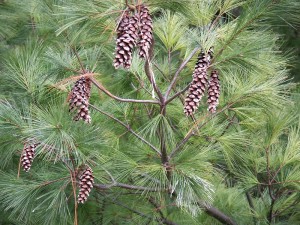 retrieved from: https://gobotany.newenglandwild.org/species/pinus/strobus/
retrieved from: https://gobotany.newenglandwild.org/species/pinus/strobus/
Tsuga canadensis
Common name: eastern hemlock
Useful cultivars and selections: –
USDA hardiness zone: 3
Mature height and spread: 40-70 ft tall by 25-35 ft wide
Form: multiple upright shoots, spreading tree
Water use: medium
Soil requirements: well drained
Leaf arrangement:
Fall colour: evergreen
Flower/cone/fruit descriptions: cones look like western hemlock cones
Limitations: branches are brittle
Suitable uses: open areas
ID description: very tiny pegs, upside down row of small needles pointing forward on top of branches
